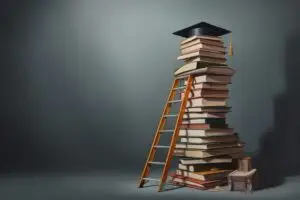Define Education
Define Education Understanding Its substance and significance Education is a foundation of mortal development and societal progress. It shapes individualities, energies husbandry, and fosters global understanding. In this blog post, we will explore the multifaceted nature of education by answering crucial questions What’s the stylish description of education? the short description of education? What’s this education? What’s the stylish description of an education essay? also, we will look into the significance of education and illustrate education in practice.
What’s the Stylish description of Education?
Education can be astronomically defined as easing literacy, or the accession of knowledge, chops, values, beliefs, and habits. Educational styles include tutoring, training, lying, discussion, and directed exploration. Education constantly takes place under the guidance of preceptors, but learners may also educate themselves in a process called self-taught literacy. This comprehensive description highlights that education isn’t just confined to formal settings like seminaries and universities but also encompasses informal and non-formal surroundings where learning happens. The stylish description of education, thus, encompasses its part in nurturing intellectual growth, character development, and the transmission of culture. It’s a lifelong process that begins at birth and continues throughout a person’s life, constantly evolving to meet the requirements of individualities and societies.
What’s the Short Description of Education?
A short description of education could be” Education is the process of acquiring knowledge, chops, values, and stations through colorful forms of literacy.” This shortly captures the substance of education without probing into the myriad of styles and surroundings in which it occurs. What’s This Education? To understand” this education,” we must fete that education is dynamic and environment-dependent.” This education” refers to the current state and approach of educational systems and doctrines in society. It addresses contemporary challenges and openings, similar to integrating technology in the classroom, promoting inclusive education, and preparing scholars for a fleetly changing job request. In the moment’s world,” this education” emphasizes critical thinking, creativity, and problem-solving chops. It values the capability to acclimatize and thrive in different surroundings and prepares individuals to be responsible global citizens.

What’s the Stylish description of an Education Essay?
This ultramodern approach to education recognizes the significance of emotional intelligence and social chops, icing that scholars aren’t only academically complete but also able to navigate complex social geographies. What’s the Stylish description of an Education Essay? An education essay aims to explore and dissect colorful aspects of education, offering perceptivity, arguments, and reflections on its significance, challenges, and impact. The stylish description of an education essay is a piece of writing that critically examines a particular educational content, furnishing substantiation-grounded arguments and particular perspectives to inform and engage compendiums. A well-drafted education essay should 1. easily define the content or question being addressed.
Conclude with a summary of the crucial points
2. Present a coherent thesis statement or main argument. 3. give a balanced analysis supported by exploration and exemplifications. 4. Reflect on the counteraccusations of the findings and suggest possible results or unborn directions. 5. Conclude with a summary of the crucial points and a paraphrase of the thesis. An education essay serves not only as an academic exercise but also as a medium to contribute to the broader converse on education, impacting programs, practices, and comprehension. significance of Education The significance of education can not be exaggerated. It’s the foundation upon which individualities and societies make their future. Then are some crucial reasons why education is pivotal 1.
Personal Development
Education nurtures cognitive capacities, critical thinking, and problem-solving chops. It promotes intellectual curiosity and lifelong literacy, empowering individuals to achieve their full eventuality. Education helps individuals develop a sense of identity and tone- worth, fostering confidence and independence.
2. Economic Growth
An educated pool is essential for profitable development. Education enhances productivity, invention, and entrepreneurship, leading to job creation and advanced inflows. It also reduces poverty and inequality by furnishing individuals with the chops demanded to pierce better employment openings. Countries with advanced education situations tend to have stronger husbandry and further robust labor requests.
3. Social Cohesion
Education fosters social integration and cohesion by promoting participated values, artistic understanding, and respect for diversity. It helps make inclusive societies where individuals can unite and contribute to the common good. Through education, people learn to appreciate different perspectives, work together to break common problems, and make a sense of community.

4. Health and Well-being
Education appreciatively impacts health by promoting healthy actions, perfecting health knowledge, and adding access to healthcare services. Educated individuals are more likely to make informed opinions about their health and well-being. They’re also better equipped to understand and navigate health systems, leading to better health issues for themselves and their families.
5. commission
Education empowers individuals, particularly women and marginalized groups, by furnishing them with the knowledge and chops to challenge demarcation and advocate for their rights. It promotes gender equivalency and social justice. Education enables people to share completely in society, make their voices heard, and effect change in their communities.
6. Sustainable Development
Education is a crucial motorist of sustainable development. It equips individuals with the knowledge and chops to address global challenges like climate change, environmental decline, and resource operation. Education fosters a sense of responsibility and stewardship, encouraging individuals to take conduct that contributes to a sustainable future for all. illustration of Education To illustrate the transformative power of education, consider the story of Malala Yousafzai. Malala, a Pakistani activist for womanish education, became the youthful-ever Nobel Prize laureate at 17.
Despite facing life-hanging opposition
Despite facing life-hanging opposition from the Taliban, she continued to endorse the right of girls to have an education. Malala’s trip began in her birthplace of Mingora in Pakistan’s Swat Valley, where she attended an academy innovated by her father. In 2009, she started writing a blog for the BBC under an alias, detailing her life under Taliban rule and the challenges of getting an education. Her brave activism brought global attention to the plight of girls in her region and beyond. In 2012, Malala survived an assassination attempt by the Taliban, which only strengthened her resoluteness. She continued her advocacy on a transnational stage, addressing the United Nations and meeting with world leaders. Her story is an important illustration of how education can inspire individuals to overcome adversity, advocate for change, and make a significant impact on the world. Another compelling illustration of education’s impact is the story of Frederick Douglass, an American social leftist, abolitionist, and pen.
1. Availability and Inclusivity
Technology has made education more accessible to people around the world. Online courses, educational apps, and virtual classrooms enable scholars to learn from anywhere, breaking down geographical walls. This is particularly important for individuals in remote or underserved areas who may not have access to traditional educational institutions.
2. Substantiated Learning
Educational technology allows for substantiated literacy gests acclimatized to the individual requirements and preferences of scholars. Adaptive literacy platforms use data and analytics to customize assignments, give real-time feedback, and support discerned instruction. This approach helps scholars learn at their own pace and style, enhancing their understanding and retention of material.
3. Interactive and Engaging Content
Digital tools and multimedia coffers make learning further interactive and engaging. Educational vids, simulations, and games prisoner scholars’ interest and make complex generalities easier to understand. These coffers also feed different literacy styles, such as visual, audible, and kinesthetic, icing that all scholars can profit.
4. Collaboration and Communication
Technology facilitates collaboration and communication among scholars and preceptors. Online discussion forums, cooperative systems, and social media platforms enable learners to connect, partake in ideas, and work together, fostering a sense of community and cooperation.
5. Lifelong literacy
The digital age has made lifelong literacy more doable and essential. nonstop education and skill development are necessary to keep up with the rapid-fire pace of technological advancement and changing job requests. Online courses, webinars, and digital libraries give openings for individuals to continue learning and growing throughout their lives. Challenges and Unborn Directions While education holds immense eventuality, it also faces several challenges that must be addressed to ensure its effectiveness and inclusivity.
1. Equity and Access
Despite progress, differences in educational access and quality persist, particularly for marginalized and underprivileged groups. sweats must be made to ground these gaps and ensure that all individuals have equal openings for admit a quality education.
2. Backing and coffers
Acceptable backing and coffers are critical to the success of educational systems. Investments in structure, schoolteacher training, and educational accouterments are necessary to give a conducive literacy terrain and support pupil achievement.
3. Class and Pedagogy
The class and tutoring styles must evolve to meet the requirements of a changing world. Emphasizing critical thinking, creativity, and problem-solving chops is essential for preparing scholars for unborn challenges. also, incorporating different perspectives and artistic capabilities can enrich the literacy experience and promote global understanding.
4. Schoolteacher Support and Professional Development
Preceptors play a pivotal part in the education system, and their support and development are vital. furnishing ongoing professional development, mentorship, and coffers can help preceptors stay current with stylish practices and effectively address the requirements of their scholars. Emphasizing critical thinking, creativity, and problem-solving chops is essential for preparing scholars for unborn challenges. also, incorporating different perspectives and artistic capabilities can enrich the literacy experience and promote global understanding.
5. Integration of Technology
While technology offers numerous benefits, it also presents challenges, similar to digital knowledge, cybersecurity, and indifference Emphasizing critical thinking, creativity, and problem-solving chops is essential for preparing scholars for unborn challenges. also, incorporating different perspectives and artistic capabilities can enrich the literacy experience and promote global understanding.
Tags: What is the best definition of education essay?, What is the best definition of education?, What is the short definition of education?, What is this education?